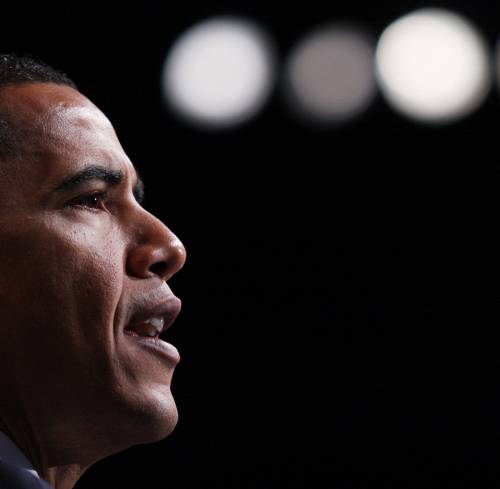Obama’s Delicate Balancing Act
The president-elect has raised the expectations for all of us, patriotic expectations, moral expectations, expectations of what it means to be a citizen. But as Obama raises expectations, he must also lower them. There are going to be sacrifices involved. That’s the trick.
Jul 31, 202025.6K Shares1.2M Views
President-elect Barack Obama (WDCpix)
It would be lovely for there to be — if not a full honeymoon period — just a quiet reflective day or two to take stock of what just happened. Whatever the reason, a tanking economy and a wildly unpopular incumbent no doubt high on the list, America just voted a black man into the highest office in the land.
In the polling booths and on the streets after, people smiled at the immensity of what had happened, what they, with the touch of a screen or the mark of a ballot, had participated in: history. Not just history, but a redress of that history.
Illustration by: Matt Mahurin
There were tears when the victory was announced. Not just in the big crowd in Chicago, where President-elect Barack Obama spoke, but in living rooms everywhere. I know. I saw them in my own living room. I shed a few.
With his rare oratorical gifts, his eloquence, Obama caught that tone in his post-victory speech. He nodded hard at America’s complicated history, but he didn’t dwell there. His was not a racial victory — not just that anyway.
At every turn, Obama eschews the divisive and goes big — raising expectations for everyone. His is a big, wide call for us to band together and be our better selves, post-partisan, patriotic, a word he uses not as a cudgel but as an invitation.
No question, that invitation is resonating. Not just with the young, who are just stepping up for their turn at the bat and who voted in record numbers. They canvassed and called; they traveled the country, eager and earnest and lit up with the chance to be participants.
But the Obama invitation works for many of the older folk, too, the baby boomers, the Clinton and Bush cohort. There is a sense among them — among us, I should say, as I am in this number — of a kind of long hang-over, a sense that we did not keep up the promises of our own youthful days. Instead, we got bogged down in an internecine generational battle, in materialistic pleasures, those SUVS and wide-screen TVs. Of course, even in our self-judgment, there is the inevitable tinge of narcissism.
Obama’s victory turns the page, at last. But again, he does not play the generation card, just as he ran a post-racial campaign as much as possible. Though he is so clearly a post-60’s child himself, he offers a chance of redemption even to the boomers, a chance to be staked again to the country.
In short, Obama has raised the expectations for any and all of us, patriotic expectations, moral expectations, expectations of what it means to be a citizen, a voter whose vote can change history.
But as the president-elect raises those expectations, he must also lower them. That’s the trick, the balancing act.
Because we are in a downward spiral, a tough economic contraction that will, if he is not careful, threaten to nibble away at the energy and optimism he brings to the table. It’s going to be tough. There are going to be sacrifices. More people are going to lose jobs and homes and health care.
He knows it. We know it. He has to be able to lower our expectations — while raising them at the same time, not just with his verbal gifts, but with his first appointments and actions.
He has to keep us excited, on board, even as we are uncertain and fearful of what lies ahead. No question, this is going to be a tough Christmas. You can feel it out there in the shops and the malls. People are not going to spend. It’s going to be harsh.
We have been in a long, prosperous boom — really since the early 80s — more and more stuff, bigger and bigger houses and toys, a rip-roaring economy going more and more global. As many became ever more successful in their private and professional lives, they grew farther from a sense of a communal, civic life.
The go-it-alone atmosphere of the Bush administration — what Obama called the “ownership socieity” meaning “you’re on your own” — did not help. There has been a real paternalistic swagger to the Bush folk, much diminished, of course, in the final throes, by the economic down-turn. But for a long time, they strode the world stage full of certitude and secrecy.
The Clinton administration toyed with raising bigger expectations for any and all, but they were, in a sense, personal expectations, that we would do well for ourselves, achieve a lot. Certainly the economy boomed. But, let’s be honest, some of the big de-regulating that we now have to pay for happened then, too, not just in the Bush years.
There was peace, though the Clinton folk, arguably, did not focus hard on the first acts of terrorism, a forerunner of what was to come. By that time, in his second term, Clinton was bogged down in defending himself after a dalliance with a bouncy intern in a beret.
Bye-bye boomers. The new guys are coming, Obama at their helm. Calm, steely, deeply married, a devoted father of young kids, he comes with the promise of a new beginning on every level.
But he is a child of that economic boom, too; a product of a great education, high achievement, a big house. It will fall to him, right off the bat, to deal with the nation’s fears while keeping our optimism up, to calm the country while beckoning it to make tough, expensive choices about health care and education.
It is a big, nuanced balancing act: lowering expectations while raising them at the same time. Obama must now lead a country full of both hope—and fear.
Anne Taylor Fleming is a novelist, commentator and essayist for “The NewsHour with Jim Lehrer.” She is the author of a memoir, “Motherhood Deferred: A Woman’s Journey.”

Hajra Shannon
Reviewer
Latest Articles
Popular Articles

